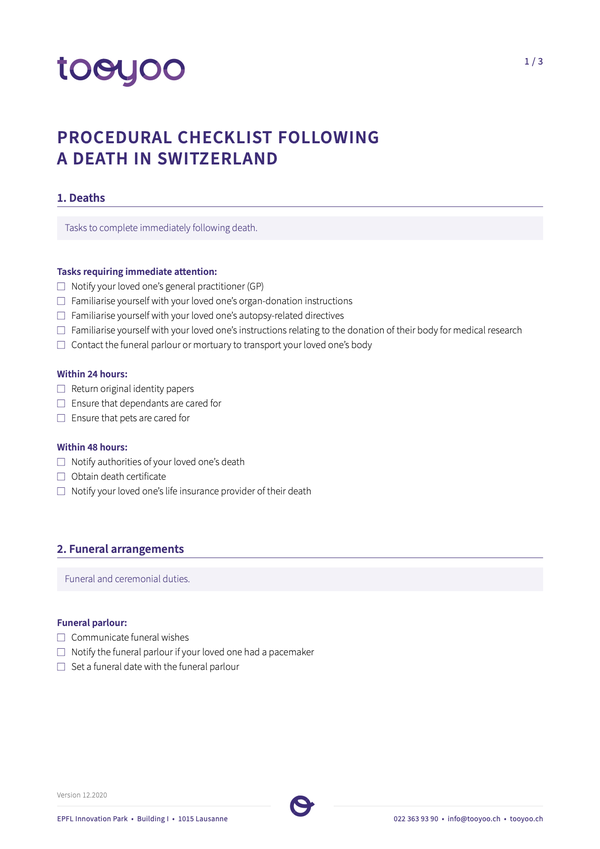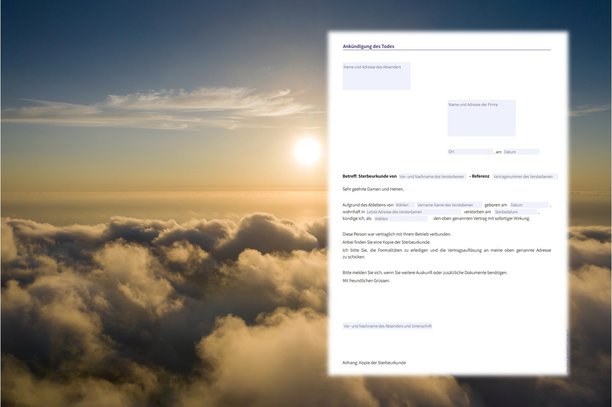
In this checklist, which can be downloaded as a PDF file, you’ll find a list of the various steps to be taken, from announcing the death and organising the funeral to dealing with various administrative formalities and handling the inheritance.
More detailed information on these different steps can be consulted below.
Download template in PDF
Procedures to follow and formalities after someone passes away in Switzerland
-
Should a death certificate be requested?
Yes, this document is essential when notifying competent authorities of the person’s death. If the person passes away in a hospital or nursing home, the staff will register the death.
-
Is it possible to request an autopsy in Switzerland?
This is perfectly possible. Contrary to what one might think, autopsies are not only used in criminal cases. They can also be used to assess the quality of care provided, or to investigate genetic diseases. It is therefore possible to carry out a medical autopsy, which can mark an important step in the grieving process.
-
When and how should the Civil Registry be notified?
The death must be notified within two days.
Once a death certificate has been obtained, you should contact the Civil Registry for your area. Funeral parlours can also provide this service.
Depending on the canton, different documents will be required. Ideally, you should be in a position to provide:
- A copy of the death certificate
- A certificate of residence (or family record book)
- An identity card or passport
- Marriage certificate or civil record
- A settlement or residence permit (for non-Swiss nationals)
Note that some cantons are less exacting in their requests for paperwork and may take care of collecting the necessary papers themselves.
-
What needs to be done to organise the funeral?
In Switzerland, the funeral must take place between 48 and 98 hours after the death. Depending on the canton, funerals can be organised up to five days after the death, if the body is stored in a refrigerated vault.
Funerals must be organised with the help of a funeral parlour, as they are authorised to transport the body of the deceased.
When organising the funeral, several choices must be made. The more information you have about the wishes of the deceased, the easier it will be to make such choices and avoid conflicts among family members. The funeral parlour will assist in the various procedures.
-
How much does a funeral cost?
This is a valid question but it’s impossible to give a precise answer. Costs vary significantly depending on the choice of service provider (public or private) and the tasks entrusted to them, i.e. whether they manage everything or only some considerations.
As discussed above, many different funeral rites exist, which in turn leads to some variation in costs.
And within the same rite, the level of service expected may vary. For example, while a standard coffin costs around CHF 1,000, other models are priced many times higher. A fuller assessment can be found here.
-
Which other formalities are required after someone passes away?
The government bodies are not the only entities who must be notified of the death. Here is a list of the different organisations that must also be informed:
- Landlord/property manager
- Employer/pension fund
- Bank
- Insurer (healthcare, life and accident insurance, etc.)
- AHV/AVS
- Tax authorities
- Car registration office
- Associations and clubs of which the deceased was a member
- Newspapers to which they were subscribed
- Subscription software and social media providers
- Telecoms company
-
What about the management of online accounts?
The person’s online legacy must also be managed. Often the scale of this task is underestimated. If the deceased left details of their various accounts, including access information, it will be very simple to delete them. Failing that, the task is more difficult because each company will have to be contacted in writing, and each one applies different rules for deleting accounts. In most cases, it is possible to request an online account to be closed. This applies to Twitter, iCloud (Apple) and Facebook, for example. However, it is not possible to retrieve data from these accounts.
Consequently photos, videos, texts or other files are likely to disappear for good. Some data is unimportant, such as administrative documents. But other information has sentimental value.
-
Is it possible to prepare for one’s passing?
Of course, we’d even recommend doing so. ‘Anticipate’ is the watchword
The Swiss system is complex, with many regional particularities, and the cost of procedures involving notaries and funeral parlours can easily mount up.
Additionally, such procedures may have to be undertaken quickly (2-4 days to organise a funeral) at a time when people are supposed to be in mourning.
If there is one thing to remember about the long administrative period after someone passes away, it is that certain steps can be taken in advance. This is also the best way to ensure that one’s wishes are respected, in case of incapacity or when a medical decision needs to be taken.
Finally, with the benefit of clear guidelines, relatives can avoid misunderstandings arising from differences in interpretation.
Making preparations for one’s death is not only for ourselves, but also serves our loved ones.

